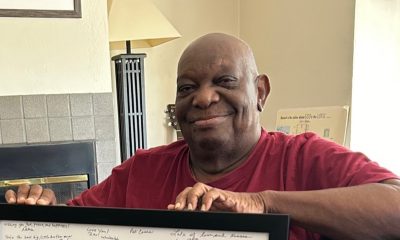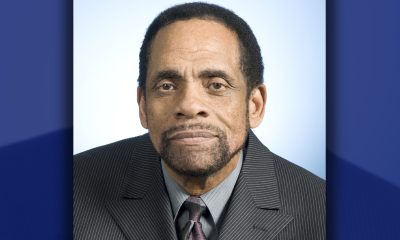Business
Obama, Abe Putting Joint Face on Trade Amid Opposition in US

President Barack Obama hosts a state arrival ceremony for Japanese Prime Minister Shinzo Abe, Tuesday, April 28, 2015, on the South Lawn of the White House in Washington. (AP Photo/Jacquelyn Martin)
(Associated Press) – Eager to build on the U.S.-Japan alliance, President Obama and Japanese Prime Minister Shinzo Abe will work to strengthen economic ties while confronting stiff resistance from Obama’s own political party to a massive new Pacific Rim trade deal.
Trade is one of the top agenda items for Abe’s state visit to the U.S. as the two countries work toward a 12-nation Trans-Pacific Partnership agreement that would further open vast Asian and Pacific rim markets to U.S. exports.
Abe’s visit comes as Obama’s negotiators work to complete the trade agreement, and as Obama seeks authority from Congress to put the deal, once it’s completed, on a fast track to approval later this year. Obama is pressing for the trade agreement and the negotiating authority against mounting pressure from liberals and labor unions who fear trade agreements can cost American jobs.
The U.S. and Japan are the agreement’s biggest participants and the talks between the two countries would go far in advancing the broader negotiations. But while Obama and Abe won’t be ready to announce a trade breakthrough, officials on both sides say they will likely declare they have made considerable progress in closing remaining gaps. The toughest sticking points are U.S. tariffs on Japanese pickup trucks and barriers in Japan on certain U.S. agricultural products.
Ahead of Tuesday’s meeting and the pomp and circumstance of a state visit, Obama took Abe to the Lincoln Memorial Monday afternoon. Obama played tour guide, leading the Japanese leader up the steps into the memorial where they examined the Gettysburg Address sketched into the marble walls.
Also on Monday, Japanese and U.S. foreign and defense ministers meeting in New York approved revisions to the U.S.-Japan defense guidelines. The new rules boost Japan’s military capability amid growing Chinese assertiveness in disputed areas in the East and South China Sea claimed by Beijing. The changes, which strengthen Japan’s role in missile defense, mine sweeping and ship inspections, are the first revisions in 18 years to the rules that govern U.S.-Japan defense cooperation.
Indeed, China’s economic and military footprint serves as a major backdrop for Abe’s visit.
Obama has undertaken an effort to rebalance the U.S. role in Asia and has argued time and again that without a trade agreement with Asian countries, China will step into the breach.
“If we don’t write the rules, China will write the rules out in that region,” Obama said in an interview with The Wall Street Journal. “We will be shut out — American businesses, American agriculture. That will mean a loss of U.S. jobs.”
Abe is sure to get a flavor of the opposition Obama confronts from Democrats and from the political left. He will address a joint meeting of Congress on Wednesday, and a coalition of trade deal critics plan to place a giant Trojan Horse, symbolizing the fast-track authority Obama seeks, well within view of his motorcade.
Likewise, Republican supporters of the trade deal were applying pressure on Abe. In an opinion piece in The Washington Post, House Ways and Means Committee Chairman Paul Ryan urged Abe to stand up to the Japanese farms and auto lobbies in favor of more open trade.
Educated at the University of Southern California, Abe will be the first Japanese leader to address both houses of Congress. He intends to deliver his remarks in English.
Abe’s visit comes on the 70th anniversary of the end of World War II and has already prompted demands that he use his trip to address the use of sex slaves by the Imperial Army during the war. The issue has been a major irritant with South Korea, which has demanded an apology from Abe.
Nothing seemed to underscore the reconciliation between the countries more than the agreement to boost the U.S.-Japan defense relationship, which would allow Japan to play a bigger role in global military operations with an eye on potential threats from China and North Korea.
Secretary of State John Kerry said the shift marks a historic transformation in the post-WWII relationship between Tokyo and Washington that recognizes the “evolving risks and dangers both in Asia-Pacific and across the globe.”
Japanese Foreign Minister Fumio Kishida agreed, saying “the security situation around Japan is becoming more harsh and difficult.”
The revisions come with a renewed pledge of the U.S. position that the Senkaku Islands — a group of small, uninhabited islands in the East China Sea — fall under Japanese administration and are within the scope of the U.S.-Japan mutual defense treaty. China also claims the islands, which Beijing calls Diaoyu.
China on Tuesday reiterated its claim on the islands.
“No matter what anybody says or does, the fact won’t change that the Diaoyu Islands belong to China,” Chinese Foreign Ministry spokesman Hong Lei said. “The Chinese government will firmly defend the country’s territorial sovereignty and integrity.”
In his interview Monday, Obama tried not to portray the U.S. as an antagonist to China but said, “We don’t want China to use its size to muscle other countries in the region around rules that disadvantage us.”
Activism
Oakland Post: Week of December 24 – 30, 2025
The printed Weekly Edition of the Oakland Post: Week of – December 24 – 30, 2025

To enlarge your view of this issue, use the slider, magnifying glass icon or full page icon in the lower right corner of the browser window.
Activism
Lu Lu’s House is Not Just Toying Around with the Community
Wilson and Lambert will be partnering with Mayor Barbara Lee on a toy giveaway on Dec. 20. Young people, like Dremont Wilkes, age 15, will help give away toys and encourage young people to stay in school and out of trouble. Wilkes wants to go to college and become a specialist in financial aid. Sports agent Aaron Goodwin has committed to giving all eight young people from Lu Lu’s House a fully paid free ride to college, provided they keep a 3.0 grade point average and continue the program. Lu Lu’s House is not toying around.

Special to the Post
Lu Lu’s House is a 501c3 organization based in Oakland, founded by Mr. Zirl Wilson and Mr. Tracy Lambert, both previously incarcerated. After their release from jail, they wanted to change things for the better in the community — and wow, have they done that!
The duo developed housing for previously incarcerated people, calling it “Lu Lu’s House,” after Wilson’s wonderful wife. At a time when many young people were robbing, looting, and involved in shootings, Wilson and Lambert took it upon themselves to risk their lives to engage young gang members and teach them about nonviolence, safety, cleanliness, business, education, and the importance of health and longevity.
Lambert sold hats and T-shirts at the Eastmont Mall and was visited by his friend Wilson. At the mall, they witnessed gangs of young people running into the stores, stealing whatever they could get their hands on and then rushing out. Wilson tried to stop them after numerous robberies and finally called the police, who Wilson said, “did not respond.” Having been incarcerated previously, they realized that if the young people were allowed to continue to rob the stores, they could receive multiple criminal counts, which would take their case from misdemeanors to felonies, resulting in incarceration.

Lu Lu’s House traveled to Los Angeles and obtained more than 500 toys
for a Dec. 20 giveaway in partnership with Oakland Mayor Barbara
Lee. Courtesy Oakland Private Industry,
Wilson took it upon himself to follow the young people home and when he arrived at their subsidized homes, he realized the importance of trying to save the young people from violence, drug addiction, lack of self-worth, and incarceration — as well as their families from losing subsidized housing. Lambert and Wilson explained to the young men and women, ages 13-17, that there were positive options which might allow them to make money legally and stay out of jail. Wilson and Lambert decided to teach them how to wash cars and they opened a car wash in East Oakland. Oakland’s Initiative, “Keep the town clean,” involved the young people from Lu Lu’s House participating in more than eight cleanup sessions throughout Oakland. To assist with their infrastructure, Lu Lu’s House has partnered with Oakland’s Private Industry Council.
For the Christmas season, Lu Lu’s House and reformed young people (who were previously robbed) will continue to give back.
Lu Lu’s House traveled to Los Angeles and obtained more than 500 toys.
Wilson and Lambert will be partnering with Mayor Barbara Lee on a toy giveaway on Dec. 20. Young people, like Dremont Wilkes, age 15, will help give away toys and encourage young people to stay in school and out of trouble. Wilkes wants to go to college and become a specialist in financial aid. Sports agent Aaron Goodwin has committed to giving all eight young people from Lu Lu’s House a fully paid free ride to college, provided they keep a 3.0 grade point average and continue the program. Lu Lu’s House is not toying around.
Activism
Desmond Gumbs — Visionary Founder, Mentor, and Builder of Opportunity
Gumbs’ coaching and leadership journey spans from Bishop O’Dowd High School, Oakland High School, Stellar Prep High School. Over the decades, hundreds of his students have gone on to college, earning academic and athletic scholarships and developing life skills that extend well beyond sports.

Special to the Post
For more than 25 years, Desmond Gumbs has been a cornerstone of Bay Area education and athletics — not simply as a coach, but as a mentor, founder, and architect of opportunity. While recent media narratives have focused narrowly on challenges, they fail to capture the far more important truth: Gumbs’ life’s work has been dedicated to building pathways to college, character, and long-term success for hundreds of young people.
A Career Defined by Impact
Gumbs’ coaching and leadership journey spans from Bishop O’Dowd High School, Oakland High School, Stellar Prep High School. Over the decades, hundreds of his students have gone on to college, earning academic and athletic scholarships and developing life skills that extend well beyond sports.
One of his most enduring contributions is his role as founder of Stellar Prep High School, a non-traditional, mission-driven institution created to serve students who needed additional structure, belief, and opportunity. Through Stellar Prep numerous students have advanced to college — many with scholarships — demonstrating Gumbs’ deep commitment to education as the foundation for athletic and personal success.

NCAA football history was made this year when Head Coach from
Mississippi Valley State, Terrell Buckley and Head Coach Desmond
Gumbs both had starting kickers that were women. This picture was
taken after the game.
A Personal Testament to the Mission: Addison Gumbs
Perhaps no example better reflects Desmond Gumbs’ philosophy than the journey of his son, Addison Gumbs. Addison became an Army All-American, one of the highest honors in high school football — and notably, the last Army All-Americans produced by the Bay Area, alongside Najee Harris.
Both young men went on to compete at the highest levels of college football — Addison Gumbs at the University of Oklahoma, and Najee Harris at the University of Alabama — representing the Bay Area on a national level.
Building Lincoln University Athletics From the Ground Up
In 2021, Gumbs accepted one of the most difficult challenges in college athletics: launching an entire athletics department at Lincoln University in Oakland from scratch. With no established infrastructure, limited facilities, and eventually the loss of key financial aid resources, he nonetheless built opportunities where none existed.
Under his leadership, Lincoln University introduced:
- Football
- Men’s and Women’s Basketball
- Men’s and Women’s Soccer
Operating as an independent program with no capital and no conference safety net, Gumbs was forced to innovate — finding ways to sustain teams, schedule competition, and keep student-athletes enrolled and progressing toward degrees. The work was never about comfort; it was about access.
Voices That Reflect His Impact
Desmond Gumbs’ philosophy has been consistently reflected in his own published words:
- “if you have an idea, you’re 75% there the remaining 25% is actually doing it.”
- “This generation doesn’t respect the title — they respect the person.”
- “Greatness is a habit, not a moment.”
Former players and community members have echoed similar sentiments in public commentary, crediting Gumbs with teaching them leadership, accountability, confidence, and belief in themselves — lessons that outlast any single season.
Context Matters More Than Headlines
Recent articles critical of Lincoln University athletics focus on logistical and financial hardships while ignoring the reality of building a new program with limited resources in one of the most expensive regions in the country. Such narratives are ultimately harmful and incomplete, failing to recognize the courage it takes to create opportunity instead of walking away when conditions are difficult.
The real story is not about early struggles — it is about vision, resilience, and service.
A Legacy That Endures
From founding Stellar PREP High School, to sending hundreds of students to college, to producing elite athletes like Addison Gumbs, to launching Lincoln University athletics, Desmond Gumbs’ legacy is one of belief in young people and relentless commitment to opportunity.
His work cannot be reduced to headlines or records. It lives on in degrees earned, scholarships secured, leaders developed, and futures changed — across the Bay Area and beyond.
-

 #NNPA BlackPress4 weeks ago
#NNPA BlackPress4 weeks agoLIHEAP Funds Released After Weeks of Delay as States and the District Rush to Protect Households from the Cold
-

 Activism4 weeks ago
Activism4 weeks agoOakland Post: Week of November 26 – December 2, 2025
-

 Alameda County3 weeks ago
Alameda County3 weeks agoSeth Curry Makes Impressive Debut with the Golden State Warriors
-

 #NNPA BlackPress4 weeks ago
#NNPA BlackPress4 weeks agoSeven Steps to Help Your Child Build Meaningful Connections
-

 #NNPA BlackPress4 weeks ago
#NNPA BlackPress4 weeks agoSeven Steps to Help Your Child Build Meaningful Connections
-

 #NNPA BlackPress4 weeks ago
#NNPA BlackPress4 weeks agoTrinidad and Tobago – Prime Minister Confirms U.S. Marines Working on Tobago Radar System
-

 #NNPA BlackPress4 weeks ago
#NNPA BlackPress4 weeks agoThanksgiving Celebrated Across the Tri-State
-

 #NNPA BlackPress4 weeks ago
#NNPA BlackPress4 weeks agoTeens Reject Today’s News as Trump Intensifies His Assault on the Press






















































